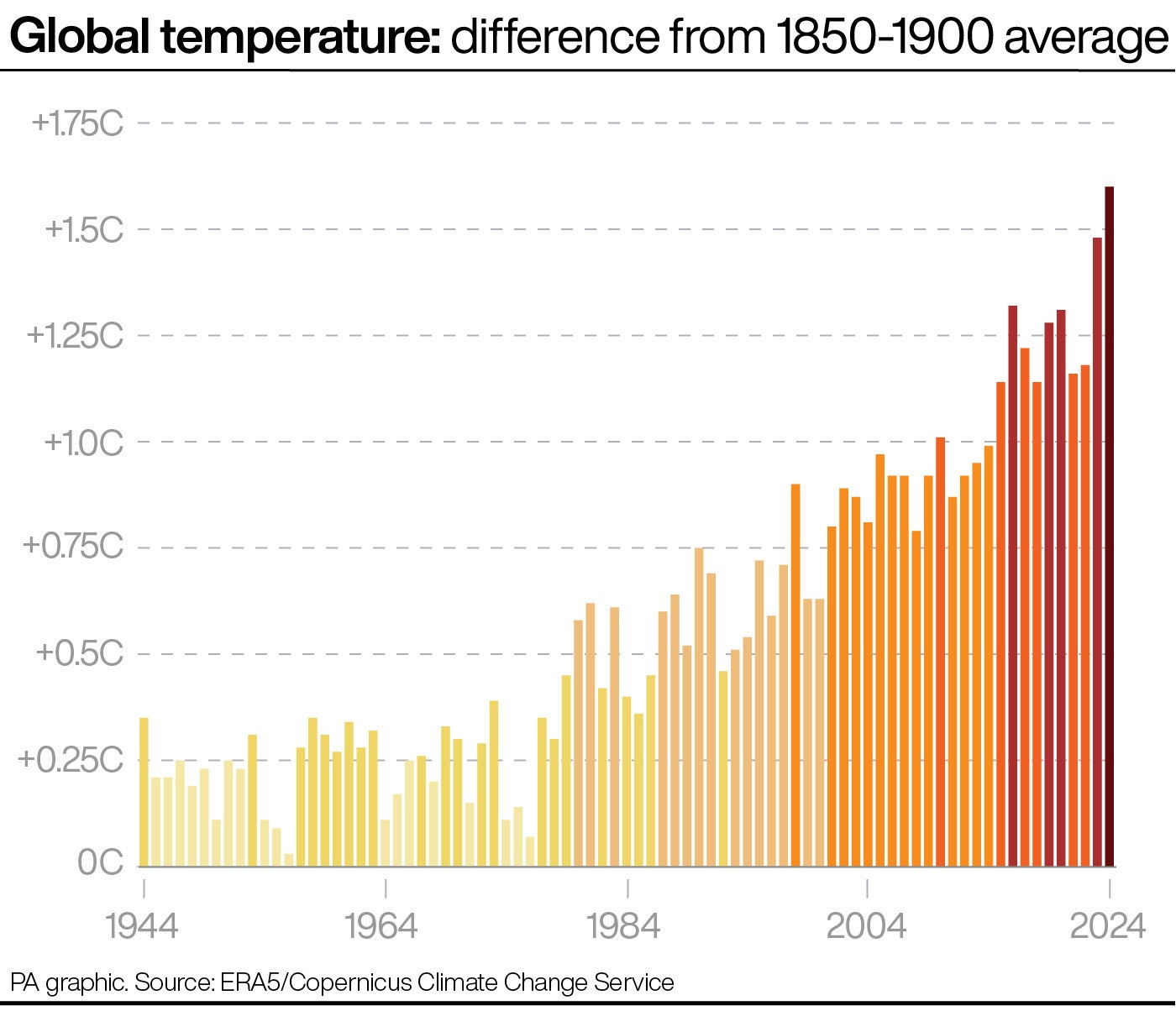
Last year was the hottest on record and the first to breach a key global warming threshold of 1.5C above pre-industrial temperatures, scientists said.
The EU’s Copernicus Climate Change Service (C3S) confirmed previous projections that 2024 was the warmest on record globally and the first calendar year that the average temperature exceeded 1.5C above pre-industrial levels.
The scientists said human-caused climate change was the primary driver for record temperatures, while other factors such as the Pacific Ocean’s “El Nino” weather phenomenon, which raises global temperatures also had an effect.
Analysis from the Met Office, University of East Anglia and the National Centre for Atmospheric Science also found 2024 was the hottest on record, and “likely” the first year exceeding 1.5C.
Climate experts said a single year with average temperatures of 1.5C above pre-industrial levels did not mean the world had reached that level of global warming, though they issued warnings about how close it now was.
But the record heat should be a “reality check” with a year of extreme weather events showing how dangerous life with 1.5C of warming was, one expert said.
Pursuing efforts to prevent the world warming more than 1.5C above pre-industrial temperatures is one of the key commitments of the global Paris treaty which countries agreed to in 2015, in a bid to avert the most dangerous impacts of climate change.
The UK analysis found that the global average temperature in 2024 was 1.53C above the 1850-1900 average, with a margin of error of plus or minus 0.08C, making it likely the first calendar year to exceed 1.5C.

It was also the 11th year in succession in the data series that has equalled or exceeded 1C above pre-industrial levels.
Colin Morice of the Met Office said: “A single year exceeding 1.5C above pre-industrial does not mean a breach of the Paris Agreement 1.5C guard rail – that would require a temperature of at least 1.5C on average over a longer period.
“However, it does show that the headroom to avoid an exceedance of 1.5C, over a sustained period, is now wafer thin.”
According to the Copernicus analysis, temperatures were an estimated 1.6C above the pre-industrial level of 1850-1900, and 0.12C above 2023 – which was the previous hottest year on record.
It was the warmest year on record for Europe, with temperatures 1.47C above the average for the 1991-2020 reference period, the figures show.
The analysis also highlights that globally, each of the past 10 years were one of the warmest 10 years on record.
Samantha Burgess, from the European Centre for Medium-Range Weather Forecasts (ECMWF) which runs C3S, said: “We are now teetering on the edge of passing the 1.5C level defined in the Paris Agreement and the average of the last two years is already above this level.
“These high global temperatures, coupled with record global atmospheric water vapour levels in 2024, meant unprecedented heatwaves and heavy rainfall events, causing misery for millions of people.”

Professor Rowan Sutton, director of the Met Office Hadley Centre, said: “By itself, 1.5C does not represent a cliff edge in terms of climate impacts.
“But every fraction of a degree rise in global temperature increases the frequency and severity of extreme weather events, commits the world to greater rises in sea level and increases the risk of crossing potential planet-altering tipping points such as breakdown of the Amazon rainforest biome or ice sheet collapse in Greenland or the Antarctic.
“This notable landmark further highlights the urgency of efforts to minimise future warming.”
In response to the announcement, Dr Friederike Otto, senior lecturer at the Centre for Environmental Policy, Imperial College London, said: “This record needs to be a reality check.
“The climate is heating to levels we’ve spent years trying to avoid because countries are still burning huge amounts of oil, gas and coal.
“A year of extreme weather showed just how dangerous life is at 1.5C.
“The Valencia floods, US hurricanes, Philippines typhoons and Amazon drought are just four disasters last year that were worsened by climate change. There are many, many more.”

Professor Joeri Rogelj, from the Grantham Institute – Climate Change and Environment, Imperial College London, added: “While the hottest year on record is alarming, the case for action makes more sense than ever: the cost of solar and wind energy is falling rapidly and is now cheaper than fossil fuels in many countries.
“Governments can build healthy economies with stronger, more decisive action to accelerate the transition to clean energy,” he said.
UK climate minister Kerry McCarthy said: “Breaching the 1.5C target sends a clear signal: there is much more work to be done to keep 1.5C within reach and prevent climate catastrophe.
“The scale of the challenge is huge, but through collective action we can deliver change at the scale and pace required.”
She added: “Not only is this crucial for our planet, it is the economic opportunity of the 21st century. Through our clean energy superpower mission this government is showing what can be done – tackling the climate crisis while creating new jobs, delivering energy security and attracting new investment into the UK.”







